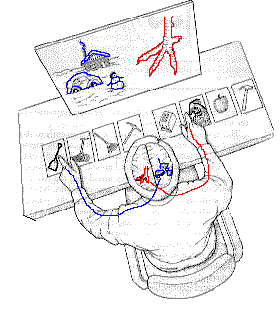An Experiment with a Split-Brain Subject
(The Corpus Callosum has been severed, a treatment for epilepsy)
The left brain dominates for language, speech, and problem solving
The right brain dominates for visual-motor tasks
 1. Each hemisphere was presented a picture that
related to one of four cards placed in front of the split-brain subject. The right
hemisphere saw the picture on the left (a snow scene), and the left hemisphere saw the
picture on the right (a chicken foot). Both hemispheres could see all of the cards.
1. Each hemisphere was presented a picture that
related to one of four cards placed in front of the split-brain subject. The right
hemisphere saw the picture on the left (a snow scene), and the left hemisphere saw the
picture on the right (a chicken foot). Both hemispheres could see all of the cards.
2. The left and right hemispheres easily picked the card that
related to the picture it saw. The left hand pointed to the right hemisphere's
choice, and the right hand pointed to the left hemisphere's choice.
3. The patient was then asked why the left hand was pointing to the
shovel. Only the left hemisphere can talk, and it did not know the answer because
the decision to point to the shovel was made in the right hemisphere.
4. Immediately the left hemisphere made up a story about what it
could see --- the chicken. It said the right hemisphere chose the shovel to clean
out a chicken shed.
Does this
reveals the left brain's interpreter in action?
Source: Gazzaniga, Michael S., "The Split Brain Revisited," Scientific
American, July 1998
The Left Brain's Interpreter
This and other split-brain experiments show that
...
Each of us has an interpreter in our left hemisphere.
This interpreter constructs theories about why we act and behave the way we do.
Thousands (perhaps millions) of brain activities go on relatively independently of
one another and all outside the realm of conscious experience. They affect body
movements, emotions, thoughts, ....
Once these brain activities are expressed, the expressions become events that the
conscious system takes note of and that the interpreter must explain.
--- "tip of the tongue" phenomena
--- "unconscious" problem solving
The interpreter constructs our conscious reality by interpreting the (limited and
fragmentary) data available to it.
Your conscious life is an "afterthought" constructed by the interpreter.
Source: Gazzaniga, Michael S., Mind Matters
Return to Honors PS1500 home page
Last modified:
Monday, March 21, 2005 11:33 AM
 1. Each hemisphere was presented a picture that
related to one of four cards placed in front of the split-brain subject. The right
hemisphere saw the picture on the left (a snow scene), and the left hemisphere saw the
picture on the right (a chicken foot). Both hemispheres could see all of the cards.
1. Each hemisphere was presented a picture that
related to one of four cards placed in front of the split-brain subject. The right
hemisphere saw the picture on the left (a snow scene), and the left hemisphere saw the
picture on the right (a chicken foot). Both hemispheres could see all of the cards.